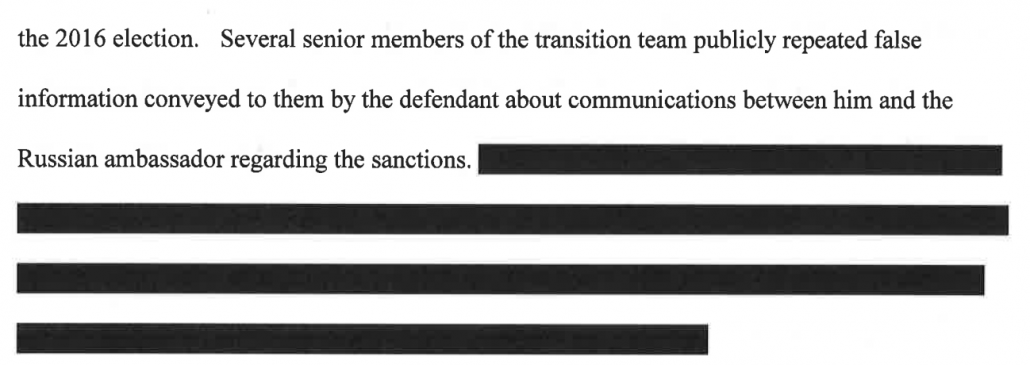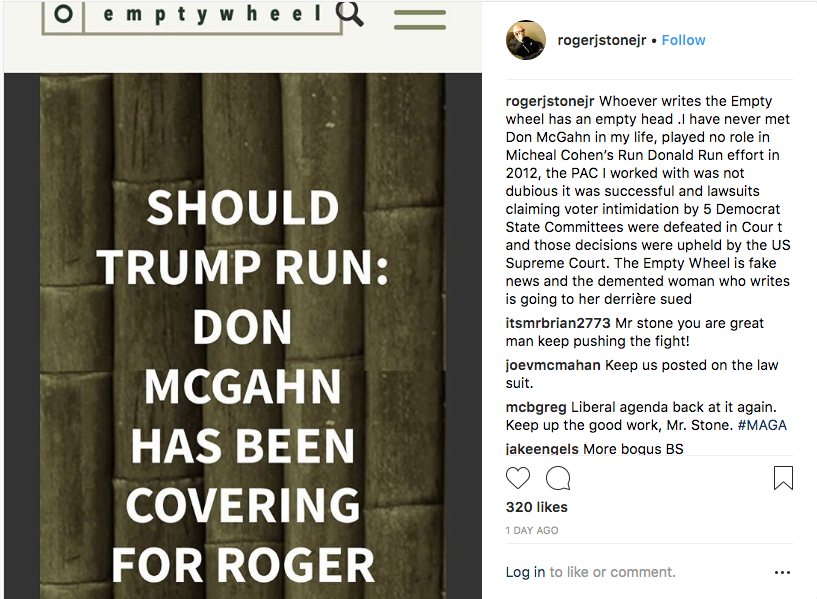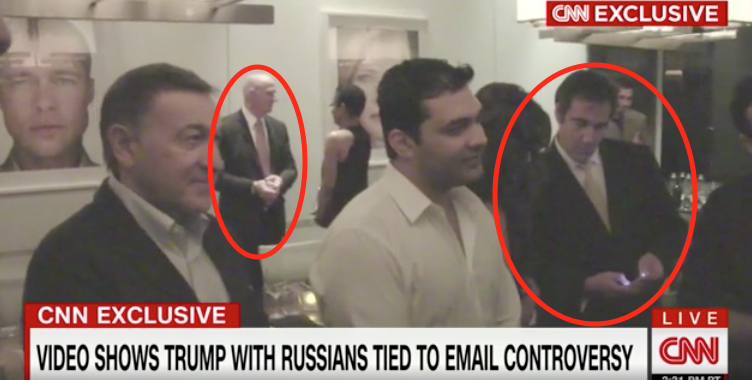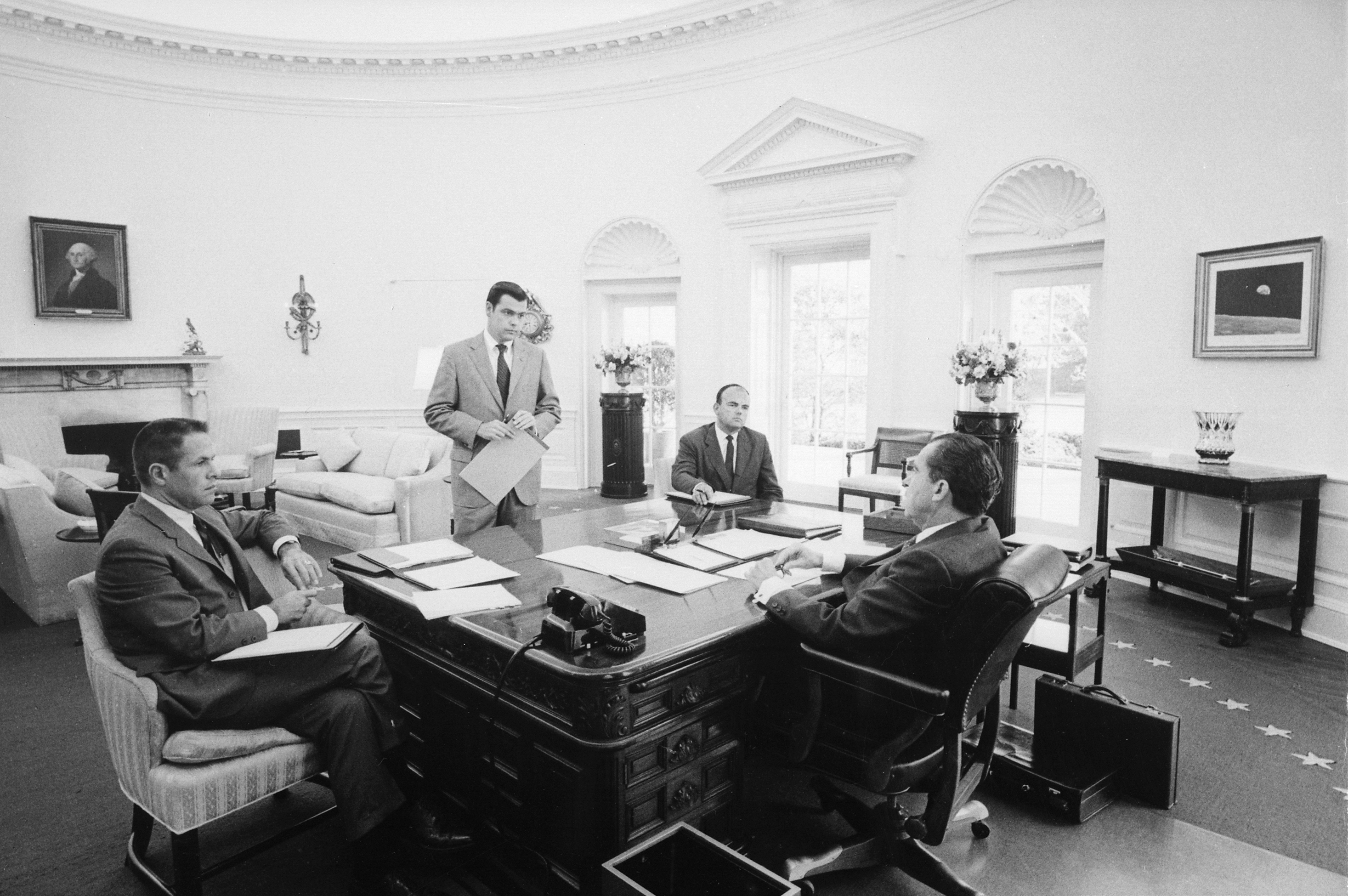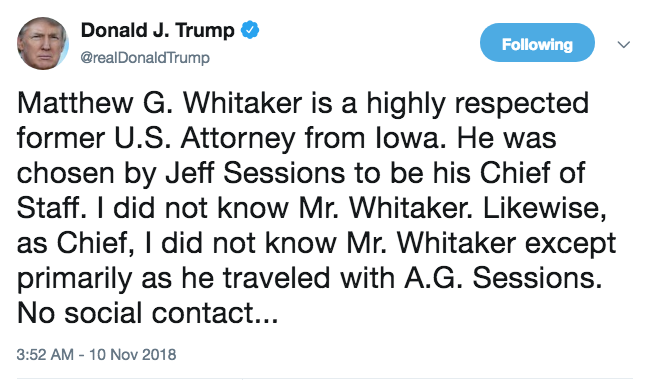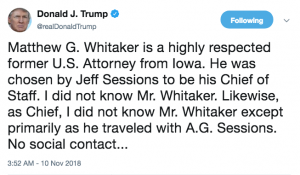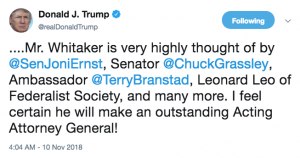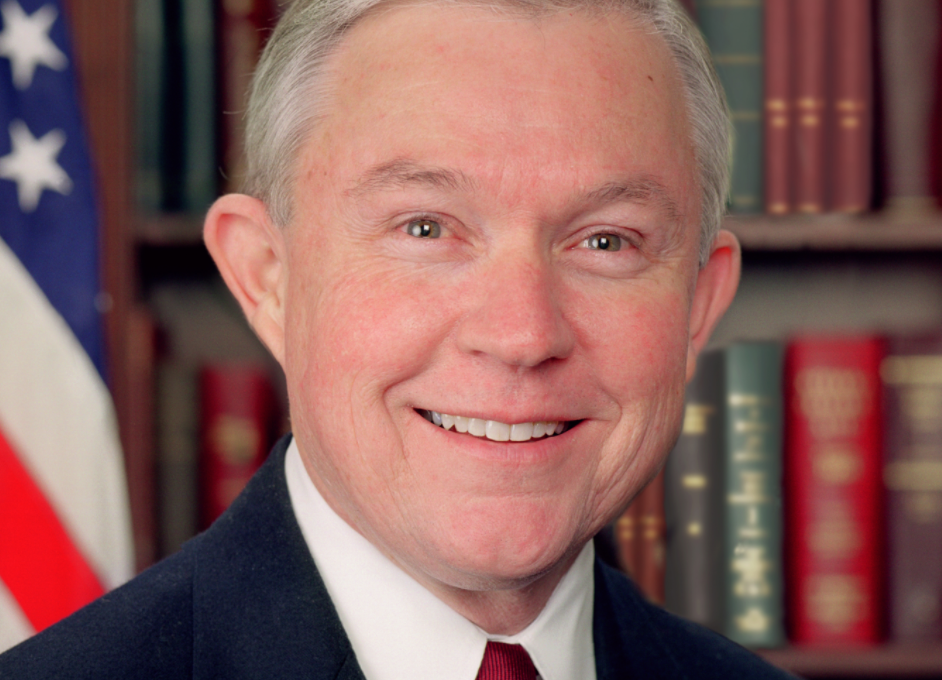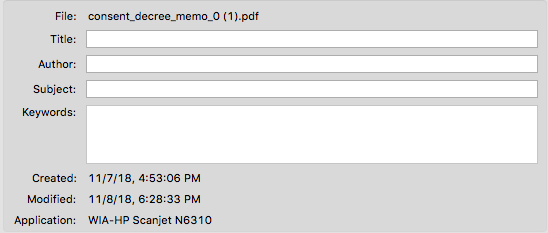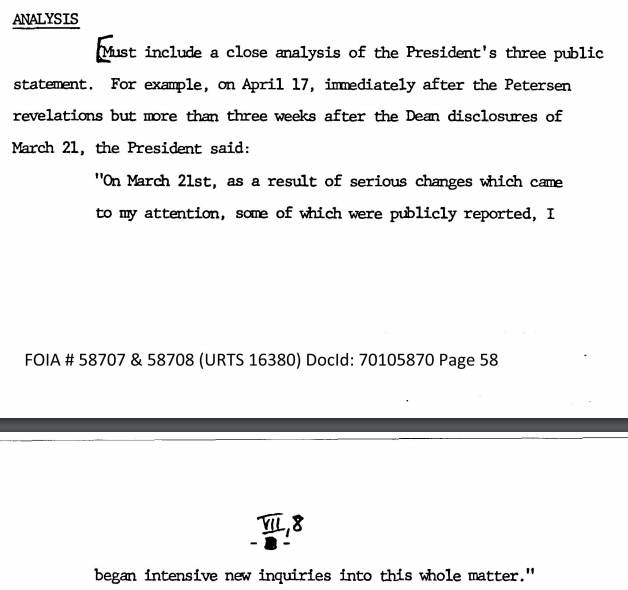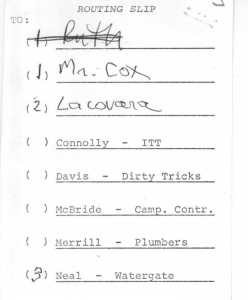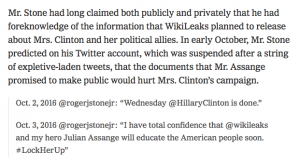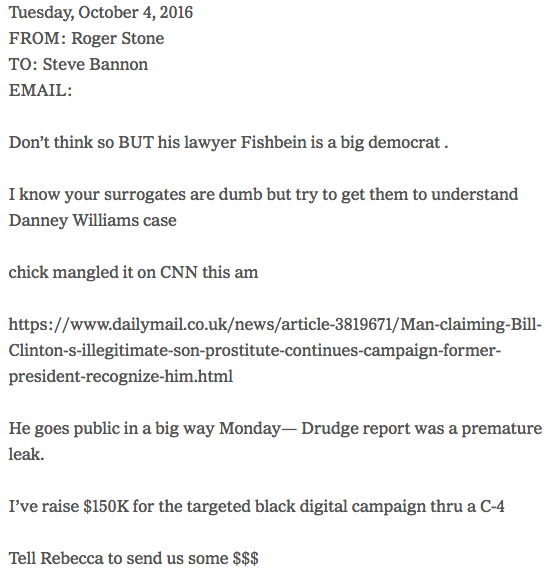The William Barr Case for Impeaching Donald Trump: From Whom Did Trump Suborn False Statements?
Last month, I argued that a memo William Barr wrote that many say disqualifies him to be Attorney General in fact (or perhaps, “also”) should make him utterly toxic to Trump, because he (unknowingly) makes the case for impeaching Trump.
That’s because of the specific content of a William Barr memo sent to Rod Rosenstein, first reported by WSJ last night. While I’m certain Barr didn’t intend to do so, the memo makes a compelling case that Trump must be impeached.
The memo is long, lacks pagination, and presents an alarming view of unitary executive power. Barr also adopts the logically and ethically problematic stance of assuming, in a memo that states, “I realize I am in the dark about many facts” in the second sentence, that he knows what Mueller is up to, repeating over and over claims about what theory of obstruction he knows Mueller is pursuing.
Yet even before Barr finishes the first page, he states something that poses serious problems for the White House.
Obviously, the President and any other official can commit obstruction in this classic sense of sabotaging a proceeding’s truth-finding function. Thus, for example, if a President knowingly destroys or alters evidence, suborns perjury, or induces a witness to change testimony, or commits any act deliberately impairing the integrity or availability of evidence, then he, like anyone else, commits the crime of obstruction.
Probably by the time Mueller’s office captured Peter Strzok’s testimony on July 19, 2017 — and almost certainly by the time they obtained Transition emails on August 23, 2017 (perhaps not coincidentally the day after Strzok’s 302 was formalized) showing Trump’s orchestration of Mike Flynn’s calls with Sergei Kislyak — Mueller has almost certainly had evidence that Trump suborned false statements from Mike Flynn. So even before he finishes the first page, Trump’s hand-picked guy to be Attorney General has made the argument that Trump broke the law and Mueller’s obstruction investigation is appropriate.
Today, as part of a rebuttal to Daniel Hemel and Eric Posner’s comments about the memo, Jack Goldsmith reviews an OLC memo they rely on to back my argument.
Barr’s invocation and application of the presidential plain-statement rule, far from shocking, is quite ordinary. It is so ordinary, in fact, that I doubt Mueller is pursuing the theory that Barr worries about, even though press reports have sometimes suggested that he is. (For similar doubts, see the analyses of Mikhaila Fogel and Benjamin Wittes and of Marty Lederman.) Deputy Attorney General Rod Rosenstein implied that Barr misunderstood Mueller’s theory when he stated that Barr did not have the “actual facts of the case.” One can read Rosenstein’s statement, as Marcy Wheeler does, to mean that Mueller possesses facts—including evidence that Trump suborned false statements from Flynn—to show that Trump has obstructed justice under Barr’s “evidence impairment” theory and that, under the Barr memorandum’s separate discussion of impeachment, Trump can be impeached.
If Wheeler is right, then the Barr memorandum is more likely to be cited in support of an article of impeachment of President Trump for obstruction of justice than it is to be cited, as Hemel and Posner suggest, to immunize Trump from obstruction. We will see if the Democrats presiding over Barr’s confirmation hearings are clever enough not to take Hemel and Posner’s suggestion that Barr’s memo is extreme, and instead use Barr’s memo, as Wheeler counsels, “to talk the incoming Attorney General into backing the logic of the Mueller probe and impeachment in a very public way.”
Given the stakes on all this, I wanted to focus on why I think the public record suggests strongly that Trump suborned perjury (actually, false statements), meaning that Barr has already made the case for impeachment.
Mike Flynn lied to hide consultations with the Transition Team at Mar-a-Lago
First, let’s consider what Mike Flynn lied about, which I lay out in detail here. In addition to lies about being a foreign agent for Turkey and trying to undercut an Obama foreign policy decision pertaining to Israeli settlements, Flynn admitted to lying about whether he discussed sanctions during a series of conversations with Sergey Kislyak. The focus in reporting has always been on the conversations with Kislyak, but as the statement of the offense makes clear, Flynn’s conversations with other Transition Team members — most notably his Deputy, KT McFarland — got almost as much emphasis.
On or about January 24, 2017, FLYNN agreed to be interviewed by agents from the FBI (“January 24 voluntary interview”). During the interview, FLYNN falsely stated that he did not ask Russia’s Ambassador to the United States (“Russian Ambassador”) to refrain from escalating the situation in response to sanctions that the United States had imposed against Russia. FLYNN also falsely stated that he did not remember a follow-up conversation in which the Russian Ambassador stated that Russia had chosen to moderate its response to those sanctions as a result of FL YNN’s request. In truth and in fact, however, FLYNN then and there knew that the following had occurred:
a. On or about December 28, 2016, then-President Barack Obama signed Executive Order 13757, which was to take effect the following day. The executive order announced sanctions against Russia in response to that government’s actions intended to interfere with the 2016 presidential election (“U.S. Sanctions”).
b. On or about December 28, 2016, the Russian Ambassador contacted FLYNN.
c. On or about December 29, 2016, FLYNN called a senior official of the Presidential Transition Team (“PTT official”), who was with other senior ·members of the Presidential Transition Team at the Mar-a-Lago resort in Palm Beach, Florida, to discuss what, if anything, to communicate to the Russian Ambassador about the U.S. Sanctions. On that call, FLYNN and the PTT official discussed the U.S. Sanctions, including the potential impact of those sanctions on the incoming administration’s foreign policy goals. The PIT official and FLYNN also discussed that the members of the Presidential Transition Team at Mar-a-Lago did not want Russia to escalate the situation.
d. Immediately after his phone call with the PTT official, FLYNN called the Russian Ambassador and requested that Russia not escalate the situation and only respond to the U.S. Sanctions in a reciprocal manner.
e. Shortly after his phone call with the Russian Ambassador, FLYNN spoke with the PTT official to report on the substance of his call with the Russian Ambassador, including their discussion of the U.S. Sanctions.
f. On or about December 30, 2016, Russian President Vladimir Putin released a statement indicating that Russia would not take retaliatory measures in response to the U.S. Sanctions at that time.
g. On or about December 31, 2016, the Russian Ambassador called FLYNN and informed him that Russia had chosen not to retaliate in response to FL YNN’s request.
h. After his phone call with the Russian Ambassador, FLYNN spoke with senior members of the Presidential Transition Team about FLYNN’s conversations with the Russian Ambassador regarding the U.S. Sanctions and Russia’s decision not to escalate the situation. [my emphasis]
And the 302 (302s are what the FBI calls interview reports) makes this even more clear: Flynn was not only lying about the content of his calls with Kislyak, he was lying about his consultations with McFarland, and through her, the rest of the Transition Team, almost certainly including Trump. Flynn was lying about using language, “tit-for-tat,” that came right out of those consultations.
He was lying to hide that his interactions with Kislyak reflect a deliberate Trump Transition policy choice, rather than his own choice to freelance foreign policy.
Flynn got other people to lie — to the public and to the FBI
But it’s not just Flynn’s lies. It’s also the lies others in the Administration told. According to the NYT story of the relevant emails, at a minimum both McFarland and Sean Spicer would have known that Flynn got instructions ahead of his call with Kislyak and reported positively afterwards.
Mr. Bossert forwarded Ms. McFarland’s Dec. 29 email exchange about the sanctions to six other Trump advisers, including Mr. Flynn; Reince Priebus, who had been named as chief of staff; Stephen K. Bannon, the senior strategist; and Sean Spicer, who would become the press secretary.
That’s important because both McFarland and Spicer lied to the press about the call in early 2017.
Early on the morning of Jan. 13, 2017, McFarland phoned one of the authors of this article to rebut a column in The Washington Post, which said Flynn and Kislyak had spoken “several times” on Dec. 29, the day the Obama administration announced it was expelling 35 Russian officials and taking other punitive measures.
The column, by David Ignatius, questioned why Flynn was engaging in sensitive foreign policy discussions with Russia when Trump had yet to take office.
McFarland insisted in an on-the-record conversation that Flynn and Kislyak had never discussed sanctions and that they had actually spoken before the administration’s announcement on Dec. 29.
[snip]
McFarland’s earlier account from the on-the-record conversation also matches public statements from Sean Spicer, the transition team’s spokesman and future White House press secretary.
Spicer said that Flynn and Kislyak spoke Dec. 28, before the sanctions were announced, and that “the call centered around the logistics of setting up a call with the president of Russia and the president-elect after he was sworn in.”
“That was it, plain and simple,” he said.
Most of the focus on public statements about the Kislyak calls has been on Mike Pence, but there’s no public record that he was in the loop on discussions about the Kislyak call (nor is there a record of him being interviewed by either the FBI or Mueller, which is one of the reasons I keep saying there’s no public record of him doing anything for which he could or should be indicted).
With McFarland and Spicer, however, we can be sure they both knowingly lied when they told the press that sanctions had not come up.
That’s why I keep pointing to two passages from the addendum to Flynn’s sentencing memo describing the significance of his cooperation. This passage makes it clear there’s some significance to the fact that Transition Team people repeated Flynn’s lies.
This passage makes it clear that, in the wake of Flynn’s cooperation, several other people decided to cooperate.
We know that McFarland is included among the people who decided to be forthcoming with Mueller; Sean Spicer probably is too and others (like Reince Priebus) may be as well. Importantly, we know they decided to be forthcoming after not having been at first. McFarland, at a minimum, lied not just to the press, but also in her first interview with the FBI, after which she made a concerted effort to unforget what really transpired.
Note, too, that that redaction is the last line of the Flynn addendum. While we don’t know what it says, it’s likely that the addendum as a whole reflects something that Mueller seems to be doing with his cooperating witnesses: either finding ways to rehabilitate liars (as he did with Michael Cohen) or using their testimony to pressure others to tell the truth, resulting in witnesses who will be more credible on the stand (which is what I suspect he has done with a number of witnesses with Flynn).
Trump has changed stories about what his Administration knew about Flynn’s lies at least twice
The public record doesn’t actually say how it happened that McFarland and Spice lied about something they should have known to be false. As I’ve laid out, it’s clear that Flynn was not free-lancing when he discussed sanctions with Kislyak, but the record is still unclear about whether he was freelancing when he ordered others to lie about it or not.
But two things strongly suggest he was not.
First, nothing yet has come close to explaining Trump’s actions with Jim Comey, first asking for his loyalty, then, after firing Flynn, asking him to let Flynn’s lies go. That’s all the more true if, as is likely but not publicly proven yet, Pence also knew he was lying when he claimed sanctions didn’t come up in the Flynn-Kislyak call, because lying to Pence is the only explanation Trump has offered for firing Flynn.
It is virtually certain Flynn was following orders — Trump’s orders — when he engaged in discussions about sanctions with Kisylak. And so it is virtually certain that Trump knew, from before he was inaugurated, that his top aides were lying to the press. Yet Trump didn’t find those lies to be a fireable offense until it became clear the lies would lead to a sustained FBI investigation into why Flynn had Kislyak hold off on responding to sanctions.
And over the course of the Mueller investigation, Trump has struggled to come up with a credible explanation for why Flynn’s lies became a fireable offense only after the FBI started looking more closely at his plans for sanctions relief.
Don McGahn wrote a report inventing one explanation for the firing just after it happened (akin to the way he later orchestrated a paper trail justifying Comey’s firing). But even when he wrote the report, it was inconsistent with what Sally Yates told McGahn.
Then, after Flynn flipped and it became clear Comey also documented his side of events (and shared those events contemporaneously with others in DOJ and FBI), Trump’s lawyers tried to massage the story one more time.
Mike Flynn, KT McFarland, Sean Spicer, Don McGahn, and John Dowd (at a minimum — possibly Reince Priebus and others, too) have all had to revise the stories they told the press and even, for some, FBI or Mueller after the fact to try to come up with a non-incriminating explanation for why everyone lied, first to the press, and then to the government.
There’s really only one thing that might explain why at least five top Donald Trump aides or lawyers had to revise stories to try to come up with innocent explanations for non-credible stories they were willing to tell the government from the start. And that’s if Trump were involved in all these lies.
It may well be that Trump didn’t formally suborn false statements before Mike Flynn interviewed with the FBI on January 24, 2017. Perhaps he just instructed Flynn to lie to the press and Flynn sustained the story he had been ordered to tell when the FBI came calling (Trump may well be more involved in the lies that Michael Cohen told to Congress).
But there is little else that can explain why so many people were willing to tell bullshit stories about Flynn (both his conversation with Kislyak and his firing) except that Trump was involved in orchestrating those stories.
Mueller’s obstruction investigation was likely always premised on a theory of obstruction that Trump’s presumed Attorney General nominee William Barr has argued does merit investigation and impeachment: that Trump ordered his subordinates to lie to obstruct an investigation.
As I disclosed last July, I provided information to the FBI on issues related to the Mueller investigation, so I’m going to include disclosure statements on Mueller investigation posts from here on out. I will include the disclosure whether or not the stuff I shared with the FBI pertains to the subject of the post.


